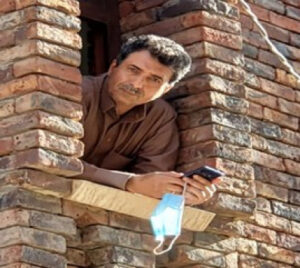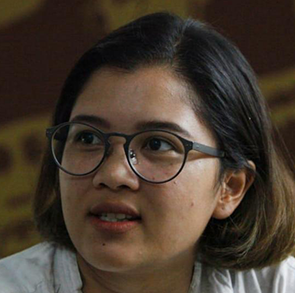The following is based on a communication written by the Special Rapporteur on Human Rights Defenders and other UN experts to the Government of Lebanon on 16 November 2021. It remained confidential for 60 days during which time the Government was expected to respond. The Government did not reply during this window. Replies, if received, will be published on the public UN Special Procedures’ Database.
BACKGROUND
Topic: alleged threats and intimidation against Mr. Mohammad Ahmad Samir Sablouh, in relation to his work as a human rights lawyer assisting victims of torture and arbitrary detention.
Mr. Mohammad Ahmad Samir Sablouh is a human rights defender, human rights lawyer and the Director of the Prisoners’ Rights Center at the Tripoli Bar Association. He has been working on documenting cases and assisting victims of torture, those arbitrarily detained, and Syrian refugees facing deportation. Among other things, he filed several cases at the domestic level under the Anti-Torture Law No. 65. At the international level, he regularly provides international NGOs with documented information, with the aim to file cases with the UN Special Procedures.
The below is a shorter version of the original communication. I also issued a press release on this case in December 2021.
ALLEGATIONS
In 2020 and 2021, Mr. Sablouh provided Amnesty International with testimonies and information regarding alleged violations committed against Syrian refugees in Lebanon. In March 2021, Amnesty International published a report on Syrian refugees arbitrarily detained on terrorism-related charges and tortured in Lebanon, which included information provided by Mr. Sablouh. His name was also mentioned in the publication.
Following the publication of the Amnesty International report, the caretaker Minister of Justice convened a meeting on 14 April 2021 with heads of security agencies and members of the Beirut and Tripoli bar associations. Mr. Sablouh attended the meeting as the rapporteur of the Prisons’ Committee of the Tripoli Bar Association. During the meeting, Mr. Sablouh said that he had provided Amnesty International with information on human rights violations, including information for the above-mentioned report, and that he had done so after exhausting all domestic avenues, to no avail. At the end of the meeting, a representative from the General Security Directorate allegedly told Mr. Sablouh that he “should not communicate with international NGOs,” and accused him of committing “high treason”. According to the source, relevant authorities also accused Mr. Sablouh of jeopardising foreign funding following the Amnesty International report, while the country was in poor economic conditions.
Following this, Mr. Sablouh reportedly experienced increased impediments to his work as a human rights lawyer, including threats and intimidation from the General Security Directorate and the Government’s Commissioner to the Military Court (“the Commissioner”).
On 15 August 2021, Mr. Sablouh filed a case of ill-treatment under the Anti-Torture Law to the office of the Public Prosecutor, which was then transferred to the Military Prosecution. The case relates to the alleged beating of detainees by prison officials in the Fakhr El-Din facility following the staging of a protest by detainees against a lack of food. The detainees were reportedly not given medical treatment for their injuries and were prevented from communicating with their families.
In his complaint, Mr. Sablouh requested an investigation into the beating of prisoners following the protest incident, as well as the general conditions in the facility. Mr. Sablouh also requested that a forensic doctor be appointed to his client and other detainees within 24 hours, as under Lebanon’s Anti-Torture Law, the Public Prosecutor is required to appoint a forensic doctor within 48 hours of receiving a complaint of torture. However, his client was reportedly only examined on 22 September 2021, over a month after the alleged ill-treatment took place.
On 23 September 2021, the Commissioner and the Military Police heard Mr. Sablouh’s client, without Mr. Sablouh present, contrary to Article 47 of the Code of Criminal Procedure. The Commissioner allegedly asked the client to say that Mr. Sablouh had fabricated the ill-treatment allegations and that he was not beaten, in exchange for his release. The client signed an investigation report under duress, that he reportedly was not allowed to read, saying that the allegations were fabricated by Mr. Sablouh and that he was unaware that Mr. Sablouh had submitted a complaint of torture on his behalf.
On 28 September 2021, the Military Prosecution sent a letter to the Tripoli Bar Association requesting that the immunity of Mr. Sablouh be lifted in order to prosecute him under Article 403 of the Lebanese Penal Code, which penalizes false accusations. On 5 October 2021, the Tripoli Bar Association officially informed Mr. Sablouh that there had been a request from the Military Court to lift his immunity, and opened an investigation into the request. On 27 October 2021, the Tripoli Bar Association replied to the request of the Military Court and refused to lift the immunity of Mr. Sablouh.
In September 2021, Mr. Sablouh defended a group of six Syrians who were reportedly detained at the General Security detention centre in Beirut and were facing deportation to Syria. General Security officers allegedly interrogated the detainees and tried to obtain information about Mr. Sablouh. Although a decision of release was issued on 9 September 2021, the detainees were not released until 12 September 2021. On 14 September 2021, a Colonel from the General Security Directorate allegedly phoned Mr. Sablouh, questioning him about his work and telling Mr. Sablouh that his clients had also been questioned in relation to his work.
Following further arrests of Syrian migrants at Beirut airport for “illegal entry” on 13, 14 and 16 September 2021, Mr. Sablouh tried to obtain a power of attorney, but was reportedly prevented by the General Security Directorate from visiting these migrants. The General Security Directorate invoked “the confidentiality of the interrogation”, which is in contradiction with the new amendment of the Criminal Procedure Law (article 47). Concerns are raised that the action taken by the General Security Directorate against Mr. Sablouh interfered with his legitimate human rights work, namely providing legal assistance to migrants in irregular situations.
In September 2021, Mr. Sablouh also represented two Syrians at risk of being deported to their home country. After being sentenced by the Lebanese judiciary for terrorism-related offences allegedly committed in Syria, the case files were transferred to the General Security Directorate, which issued deportation orders against them without judicial permission and without granting them the right to defend themselves or challenge the orders. On 2 October 2021, Al Modon published an article about the General Security Directorate’s handling of Syrian refugees, referring to the case of one of Mr. Sablouh’s clients. The article extensively cited Mr. Sablouh and his client.
On 4 October 2021, the General Security Directorate allegedly responded to the article refuting all the allegations stating that Mr. Sablouh had “no right to issue judgments or spread unlawfully acquired and inaccurate information”. The response reportedly also stated that the Lebanese state could no longer bear the presence of “terrorists” on its territory after all the terrorist operations carried out by people “disguised under the cloak of Syrian displacement”.
The same day, the Commissioner allegedly requested Mr. Sablouh to come to the court as he wanted to ask about one of the torture cases he had filed. Mr. Sablouh asked one of his colleagues to attend instead, for fear that the subject of the request to lift his immunity would have been discussed and that he may be accused of “judiciary’s vilification”, which is considered as “flagrante delicto” in Lebanon. Allegedly, this could have given the Commissioner the power to arrest Mr. Sablouh without the request to lift his immunity being granted. Mr. Sablouh’s colleague was asked by the Commissioner why Mr. Sablouh had not come, although the Commissioner did not ask the colleague any questions regarding the torture case.
CONCERNS
In the communication we expressed our deep concern at the threats and harassment against human rights defender and human rights lawyer, Mr. Sablouh, which appear to be directly linked to his legitimate work as a human rights lawyer, working on documenting cases and assisting victims of torture, those who are arbitrarily detained, and Syrian refugees facing deportation. Furthermore, we expressed our concerns regarding the targeting of Mr. Sablouh for the legitimate exercise of his right to freedom of opinion and expression, as well as of peaceful assembly and of association. We further expressed our deep concern at the attempt to lift Mr. Sablouh’s immunity, which may indicate an attempt to initiate retaliatory legal proceedings against Mr. Sablouh in order to discredit his legally sanctioned work documenting instances of torture.



